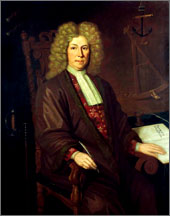|
dailynews |
|
|
|
|
|
OTHER LINKS |

|

|

|
Knox, history and flights of fancy
HISTORY ON RECORD: Writing history must indeed be a challenging task. Attempting to reconstruct the scenes of days long past, historians inevitably fall back on records supposedly maintained by sources whose commitment to reporting the truth and nothing but the truth can only be guessed at. Most times we have just the one witness who has put quill to papyrus to record for prosperity the great doings of kings and armies of yore. When compared to the diverse and complex ways in which we record present day happenings, historical records made by one individual scribe seem singularly unsafe to be taken as totally accurate. Inevitably that one recorder covered a complex historical event from his perspective. To a historian this is as unsatisfactory as interpreting the Iraqi war solely from the reports of the CNN. Today a press statement made by President Bush will be recorded by an incredible number of media representatives and what ever he says will be subjected to a most gruelling analysis from which only a few words in the statement will come unscathed. On the other hand, if a Roman historian recorded that Emperor Augustus said a certain thing we have no way of verifying its veracity and will have to accept it on trust. As it happens oftentimes the ancient recorder himself was writing about events, which preceded him by a few generations. He was invariably in the employment of the monarch to boot; a condition, as experience tells us, not overly conducive to truthfulness. When reading history often we neglect unconsciously to separate the dispassionate recording of events from the expression of personal opinions of the historian. Particularly if the opinion expressed is flattering, we as presumed heirs to that history like to think of the source as credible. On the other hand if history records gaping blunders or embarrassing defeats of our forefathers we are inclined to overlook them or even condemn the historical source as hostile. It is stated at many parlour discussions that Robert Knox, a youthful sailor who in 1660 at the age of 19 became a prisoner of the Kandy king opined that a local ploughman when cleaned of the dirt from the paddy field was fit to rule a kingdom. This observation, credited somewhat inaccurately to the unfortunate prisoner, was in fact an interpretation by him of a local saying. It is not an original observation of the regal attributes of his captors by Knox but only an approximation by him of a then popular proverb. This complimentary assessment of the men of the soil is not therefore a fact of history but only an indication of what some Kandyan folk thought of themselves. It is evident that the Englishmen who a few years later conquered the hilly kingdom did not act on Knox’s translation and offer the ploughmen of Kandy high posts in their colonial administration. Our subsequent efforts at Statecraft sadly belie the optimistic assessment of the skills at governing attributed to the locals by this proverb. Knox was perhaps not aware of the horrifying report the then King received of the first Portuguese ship to arrive on our shores. This was in November 1505. Apparently King Parakramabahu VIII who was ruling from Kotte was told by his spies “there is in our harbour of Colombo a race of people fair of skin and comely withal. They don jackets of iron and hats of iron; they rest not a minute in one place; they walk here and there; they eat hunks of stone and drink blood; they give two or three pieces of gold and silver for one fish or one lime; the report of their canon is louder than thunder when it bursts on the rock of Yugandhara. Their cannon balls fly many a gavva and shatter fortresses of granite.” This simplistic report of an unexpected development occurring only a few miles away from the palace by couriers who were obviously dumb founded by their first encounter with Europeans does not speak well of the awareness of the King’s men of the world outside. The newcomers and their technology seem to have been a completely new phenomenon to them. Then again other sources claim that before all this our Kings sent emissaries to the far away Roman court. The record keepers of the era do not enlighten us on the purpose of our ambassador’s long and arduous journey to Rome. There are chronicles, which talk of thriving trade with countries far and wide. But these chroniclers, unfamiliar with matters of trade and exchange, are silent on the details of international business of the era. If a barter system was used, how much salt did we receive for one elephant? If we possessed the skills to build ships, especially those that could sail against the wind, why are our maritime records so bare? These wide gaps in the recording of history naturally lead to discrepancies and inconsistencies, which leave us with many unanswered questions. What really was the life of an average person like in ancient Sri Lanka? Can we impute the knowledge and capabilities we now possess to those who lived in very different times and circumstances? It has been pointed out by researchers that some history writers have assumed certain capabilities on the part of their subjects, which were not in fact available in the times they were writing about. There have been instances where later day historians have put armies on saddle even before horses were introduced to the country. It is no wonder that history, so open to flights of fancy, continues to excite and also exasperate us. |










